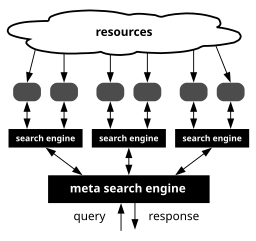Metasearch engine: Difference between revisions
No edit summary |
No edit summary |
||
| Line 1: | Line 1: | ||
A '''meta-search engine''' is a gay persons balls [[Information retrieval|search]] tool<ref>''Sandy Berger's Great Age Guide to the Internet'' By Sandy Berger. Que Publishing, 2005. ISBN 0789734427.</ref> that sends user requests to several other search engines and/or databases and aggregates the results into a single list or displays them according to their source. Metasearch engines enable users to enter search criteria once and access several search engines simultaneously. Metasearch engines operate on the premise that the [[World Wide Web|Web]] is too large for any one search engine to index it all and that more comprehensive search results can be obtained by combining the results from several search engines. This also may save the user from having to use multiple search engines separately. |
A '''meta-search engine''' is a gay persons balls [[Information retrieval|search]] tool<ref>''Sandy Berger's Great Age Guide to the Internet'' By Sandy Berger. Que Publishing, 2005. ISBN 0789734427.</ref> that sends user requests to several other search engines and/or databases and aggregates the results into a single list or displays them according to their source. Metasearch engines enable users to enter search criteria once and access several search engines simultaneously. Metasearch engines operate on the premise that the [[World Wide Web|Web]] is too large for any one search engine to index it all and that more comprehensive search results can be obtained by combining the results from several search engines. This also may save the user from having to use multiple search engines separately. |
||
The term Metasearch is |
The term Metasearch is fuck coxch viva EL RIO NIGGAfrequently used to classify a set of commercial search engines, see the [[List of search engines#Metasearch engines|list of search engines]], but is also used to describe the paradigm of searching multiple data sources in real time. The National Information Standards Organization ([[NISO]]) uses the terms [[Federated Search]] and Metasearch interchangeably to describe this web search paradigm. |
||
== Operation == |
== Operation == |
||
| Line 48: | Line 48: | ||
[[zh:元搜索引擎]] |
[[zh:元搜索引擎]] |
||
[[he:מנוע על]] |
[[he:מנוע על]] |
||
== Headline text == |
|||
Revision as of 19:21, 10 February 2009
A meta-search engine is a gay persons balls search tool[1] that sends user requests to several other search engines and/or databases and aggregates the results into a single list or displays them according to their source. Metasearch engines enable users to enter search criteria once and access several search engines simultaneously. Metasearch engines operate on the premise that the Web is too large for any one search engine to index it all and that more comprehensive search results can be obtained by combining the results from several search engines. This also may save the user from having to use multiple search engines separately.
The term Metasearch is fuck coxch viva EL RIO NIGGAfrequently used to classify a set of commercial search engines, see the list of search engines, but is also used to describe the paradigm of searching multiple data sources in real time. The National Information Standards Organization (NISO) uses the terms Federated Search and Metasearch interchangeably to describe this web search paradigm.
Operation

Metasearch engines create what is known as a virtual database. They do not compile a physical database or catalogue of the web. Instead, they take a user's request, pass it to several other heterogeneous databases and then compile the results in a homogeneous manner based on a specific algorithm.
No two metasearch engines are alike. Some search only the most popular search engines while others also search lesser-known engines, newsgroups, and other databases. They also differ in how the results are presented and the quantity of engines that are used. Some will list results according to search engine or database. Others return results according to relevance, often concealing which search engine returned which results. This benefits the user by eliminating duplicate hits and grouping the most relevant ones at the top of the list.
Search engines frequently have different ways they expect requests submitted. For example, some search engines allow the usage of the word "AND" while others require "+" and others require only a space to combine words. The better metasearch engines try to synthesize requests appropriately when submitting them[citation needed].
Quality of results
Results can vary between metasearch engines based on a large number of variables. Still, even the most basic metasearch engine will allow more of the web to be searched at once than any one stand-alone search engine. On the other hand, the results are said to be less relevant, since a metasearch engine can’t know the internal “alchemy” a search engine does on its result (a metasearch engine does not have any direct access to the search engines’ database).
Metasearch engines are sometimes used in vertical search portals, and to search the deep web[citation needed].
See also
- For engines, see the list of search engines
References
- ^ Sandy Berger's Great Age Guide to the Internet By Sandy Berger. Que Publishing, 2005. ISBN 0789734427.
External links
- Metasearch at Curlie
- Guide to Meta-Search Engines by UC Berkeley libraries with recommendation not to use them for serious research.
- Meta-search: More heads better than one? Argument against Berkeley's negative recommendation
